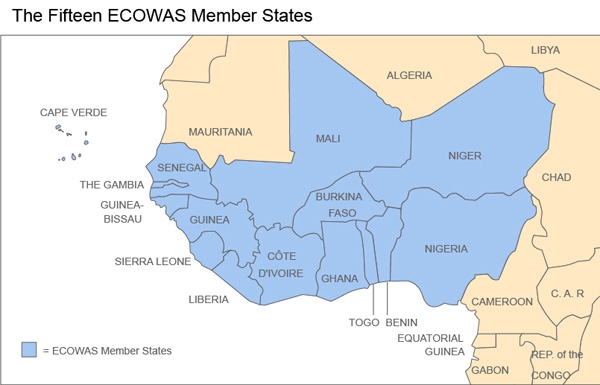ECOWAS
THE ECONOMIC COMMUNITY of West African States (ECOWAS), also known in French as Communaute Economique des Etats de l'Afrique de l'Ouest (CEDEAO), was first formally set out at the Monrovia Group meeting in April 1968. By the Treaty of Lagos, 15 representatives from West African states formed ECOWAS in Lagos, NIGERIA, on May 28, 1975. These were: BENIN, BURKINA FASO, CAMEROON, COTE D'IVOIRE, GAMBIA, GHANA, GUINEA, GUINEA-BISSAU, LIBERIA, MALI, NIGER, Nigeria, SENEGAL, SIERRA LEONE, and TOGO. CAPE VERDE later joined the community making it a 16-member economic organization. Based on their colonial experience, three official languages are spoken in West Africa: English, French, and Portuguese.
The principal objective of the treaty is the creation of an economic and monetary union. To this end, a regional trade liberalization scheme was adopted for the creation of a free trade area at the end of 1999, and a common external tariff is being implemented in phases. The three-phase program for the free movement of ECOWAS citizens has been completed. ECOWAS has pursued the physical integration of its member states through the modernization of regional highway and telecommunication networks.

ECOWAS became effective in July 1975, when the necessary seven states ratified the treaty. The first meetings of the Council of Ministers and the Authority of Heads of State and Government took place in Lome, Togo, in November 1976, at which time additional protocols to the treaty were signed. In July 1993, the 16 West African heads of state signed a revised treaty, reflecting West Africa's regional cooperation experiences over the preceding 15 years, and taking into account the exigencies of continental integration as envisaged in the Treaty of the African Economic Community.
Member states committed themselves to coordinating and harmonizing varied national economic and financial policies in order to enhance the effectiveness of national structural adjustment and economic reform programs. The ultimate goal is to facilitate the regional approach to economic development and the establishment of the monetary union. The monetary program adopted by ECOWAS has the medium-term objectives of achieving regional convertibility of the nine national currencies and, in the longer term, the creation of a single monetary zone. Meanwhile, an ECOWAS traveler's check was launched in October 1998 to facilitate regional travel and commercial transactions.
UNIFORM CURRENCY
As part of efforts to realize its uniform currency and monetary system, a West African Monetary Institute (WAMI) became operational in January 2001. The two-year transitional body is based in Accra, Ghana. There is also a Committee of Governors of West African Central Banks that has been coordinating the implementation of the ECOWAS monetary program through the West African Central Bank. A uniform currency was scheduled to come into effect in 2004.
In addition, ECOWAS is embarking on such programs as the interconnection of national electricity grids; a regional pipeline for the distribution of natural gas; community seed production and cattle breeding centers; agricultural research; a regional master plan for industrial development; coordination of desertification control; rural water supply plans; cooperation in health matters; and establishment of equivalence for degrees and diplomas.
In the treaty, particular emphasis is placed on promoting the involvement and participation of the private sector and the general public in the development and integration of the economies of the region. ECOWAS encouraged the establishment and functioning of a privately owned regional commercial bank (ECOBANK), as well as the Federation of West African Manufacturers Associations, Federation of West African Chambers of Commerce, West African Journalists Association, West African Youth Union, West African Women's Association, West African Road Transporters Union, and others. ECOMOG was created to act as peacemaking apparatus for member countries.
The Authority of Heads of State and Government is the supreme organ; it has a rotating chairmanship and meets at least once a year. The Council of Ministers comprises two representatives from each member state and also has a rotating chairmanship. It meets at least twice a year; decisions are made by a consensus. The Executive Secretariat is headed by an executive secretary appointed for a four-year term.
There are also five specialized commissions dealing with different aspects of cooperation. Provided in the treaty is a Court of Justice to ensure “the observance of law and justice, to interpret the provisions of the Treaty, and to settle disputes referred to it.” The seven justices for the court, which is based in Abuja, Nigeria, were sworn-in in January 2001 in Bamako, Mali. The treaty provides for a West African Parliament, inaugurated in Bamako, Mali, on November 16, 2000.